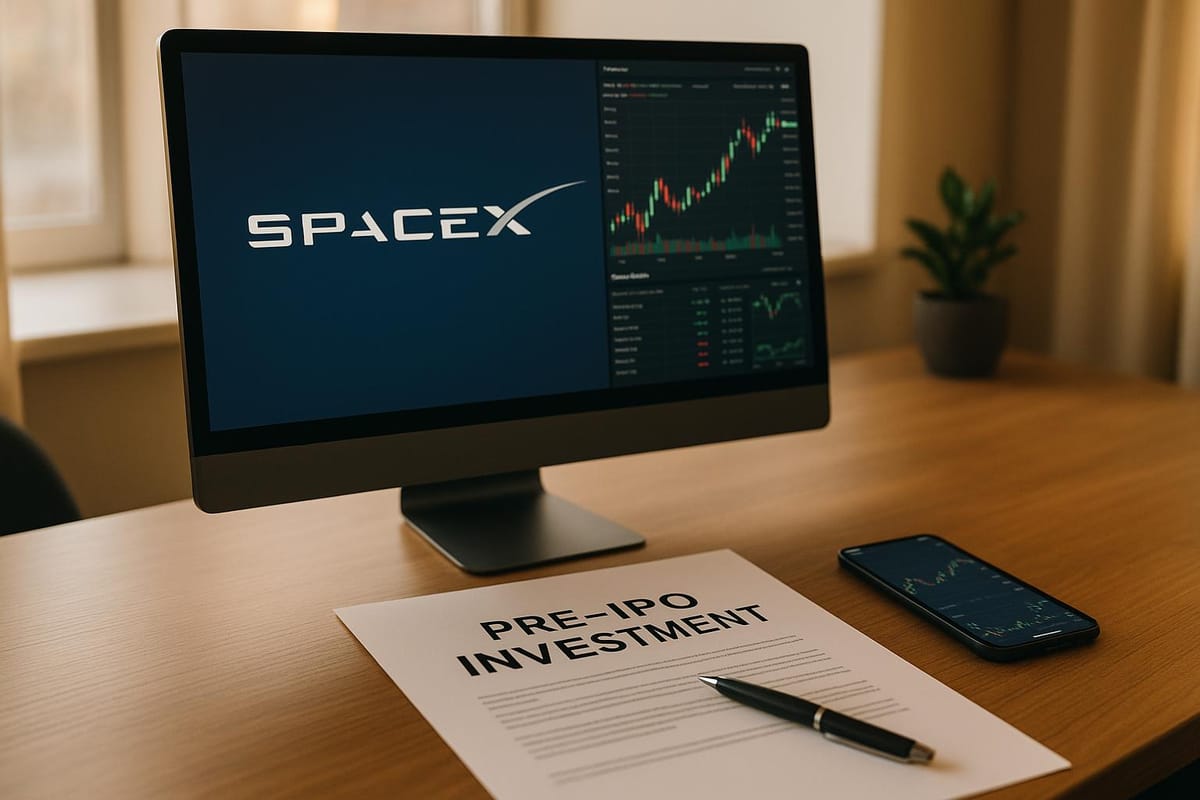How to Buy Pre-IPO Stock: Investing in SpaceX & More
Learn how to invest in pre-IPO stocks like SpaceX, OpenAI, and more. Discover exclusive opportunities for accredited investors.

Investing in pre-IPO (initial public offering) companies has long been considered the domain of Silicon Valley insiders and the ultra-wealthy. However, a growing number of accredited investors are discovering opportunities to access this previously exclusive market. With companies like SpaceX, OpenAI, and Stripe at the forefront of technological innovation, retail investors are eager to get in on the action. But how do you navigate this complex and opaque world? This guide unpacks the key insights from the Wealth Formula Podcast’s discussion on pre-IPO investing and offers a roadmap for those interested in exploring this lucrative yet challenging investment avenue.
Why Pre-IPO Investing Matters
"If you're purely investing in the public markets, in many cases, you've missed the majority of a company's growth cycle." These insightful words from the podcast underscore the main appeal of pre-IPO investing. Companies today are staying private longer, meaning a significant portion of their growth happens before they ever go public. By the time they do, retail investors are often buying shares at a much higher valuation.
Take SpaceX, Elon Musk’s groundbreaking private company, for example. With its ambitious endeavors in space exploration and Starlink satellite technology, the company has seen its valuation skyrocket in the private market. Early private investors have already witnessed exponential growth - well before the company potentially goes public.
What Is Pre-IPO Investing?
Pre-IPO investing allows individuals to purchase shares in a company while it is still private. This is typically done through bespoke, privately brokered transactions. Investors may acquire shares from early employees or venture capitalists looking for liquidity.
Key Characteristics of Pre-IPO Investments:
- Private Transactions: Unlike public markets, pre-IPO deals are negotiated privately and often involve bespoke agreements.
- Limited Liquidity: Shares are not publicly traded, meaning selling them may take time and require finding a private buyer.
- Potential for High Returns: Getting in early can lead to significant gains, provided the company succeeds or eventually goes public.
The Appeal of Companies Like SpaceX

SpaceX, along with its internet-focused subsidiary Starlink, is a prime example of the kind of companies that attract pre-IPO interest. Founder Elon Musk has a proven track record of building revolutionary companies like Tesla, which is public, but most of his other ventures, including Neuralink and The Boring Company, remain private.
For investors, companies like SpaceX represent long-term potential. But there’s a catch: Musk has shown a preference for keeping these companies private, raising questions about liquidity and exit strategies. However, as secondary markets for private shares grow, investors may still have opportunities to resell their stakes even if an IPO is far off.
Navigating the Risks
While pre-IPO investing holds promise, it’s not without risk. Companies like SpaceX or OpenAI may deliver extraordinary returns, but others, such as 23andMe or FTX, have faced severe challenges, including bankruptcy or market implosion.
Key Risks to Consider:
- Liquidity Risk: Private shares are harder to sell compared to publicly traded ones. Investors must be prepared to hold their stakes for an extended period.
- Valuation Uncertainty: Prices for pre-IPO shares can vary greatly, and without public market benchmarks, it can be difficult to determine if you’re paying a fair price.
- Regulatory Requirements: Accredited investors must meet specific financial criteria to participate.
Expert Tips: How to Get Started
Christine Healey, founder of Healey Pre-IPO, provided valuable insights into the process of investing in private companies. As a seasoned broker who has facilitated over $600 million in private deals, Healey emphasized the importance of working with experienced professionals to navigate this complex market.
Steps to Begin Pre-IPO Investing:
- Understand Accreditation Requirements: Ensure that you qualify as an accredited investor, which typically means having a net worth of $1 million (excluding your primary residence) or an annual income above $200,000.
- Work with a Trusted Broker: A reputable pre-IPO broker can provide access to vetted opportunities, contextualize pricing, and streamline the transaction process.
- Focus on High-Quality Companies: Concentrate on well-researched, high-demand names like SpaceX, Stripe, and OpenAI, which have strong backing from top-tier venture capitalists.
- Diversify Your Portfolio: Avoid over-concentration in a single company or sector. Spread your investments to mitigate risk.
- Think Long-Term: Be prepared to hold your investments for several years, as private companies don’t offer the same liquidity as public markets.
Success Stories and Cautionary Tales
Not all pre-IPO investments are created equal. While SpaceX has seen its valuation grow from under $50 billion to approximately $400 billion in private markets, other companies like Circle Internet Financial highlight the volatility of post-IPO performance. Circle, which deals in stablecoins, traded at significantly higher valuations in the pre-IPO market compared to its current public market price.
On the flip side, companies like Pinterest and Unity Technologies have rewarded early investors handsomely by growing substantially in value after going public. These contrasting outcomes underscore the critical importance of doing due diligence and approaching pre-IPO investing with a balanced perspective.
Key Takeaways
- Pre-IPO investing unlocks access to significant growth opportunities by allowing investors to participate in a company’s journey before it goes public.
- High-profile companies like SpaceX and OpenAI dominate the pre-IPO landscape, attracting buyers due to their track record of innovation and growth.
- Liquidity risk remains a major consideration, but growing secondary markets offer potential exit strategies for private shares.
- Work with experienced brokers to gain insider access, contextualize pricing, and navigate the intricate private market.
- Diversification and patience are essential to mitigate risk and maximize returns.
- Valuation is critical. Investors should compare current offers to recent market activity to avoid overpaying.
- Not all companies succeed. Examples like FTX and 23andMe highlight the importance of due diligence and risk management.
Conclusion
Pre-IPO investing is an exciting yet challenging arena that offers accredited investors the chance to participate in some of the most innovative companies before they hit public markets. While the risks are real, careful planning, diversification, and working with knowledgeable brokers can help investors unlock the potential rewards of this unique investment strategy. For those willing to do their homework and think long-term, companies like SpaceX and OpenAI could represent the future of transformative financial growth. Whether you’re a seasoned investor or just beginning to explore private markets, the possibilities are as vast as the stars.
Source: "How to Buy Stock in Companies Before They Go Public" - Wealth Formula, YouTube, Aug 25, 2025 - https://www.youtube.com/watch?v=vuDSlbEqFD8
Use: Embedded for reference. Brief quotes used for commentary/review.
Comments ()